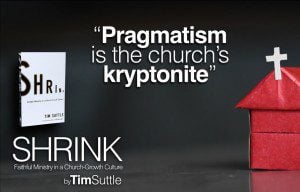 I recently wrote an article for FaithGateway.com. Here are a few pull quotes… would love to have you go to the article & share a link on Facebook or Twitter…
I recently wrote an article for FaithGateway.com. Here are a few pull quotes… would love to have you go to the article & share a link on Facebook or Twitter…
Nearly every pastor or ministry leader I’ve ever met operates with the underlying assumption that their job is to make their ministry successful. When leaders accept this premise, using it as a guiding principle, they allow the American story of bigger, better, higher, faster, and stronger to dictate the terms of leadership, over and above the life and teachings of Jesus.
This wholesale acceptance of the cultural value of success has had a profound impact on the Western church. Perhaps the most powerful reason the church is in decline in North America right now is that the church’s way of being in the world does not represent a genuine alternative to the way of the dominant culture. When the church becomes an agent of the culture, indistinguishable in most ways from society at large, people cease to see the value in belonging, and they opt out.
Nowhere is this dynamic more pronounced than in church leaders’ wholesale acceptance and integration of the ideal of success. The current church leadership culture is every bit as fascinated with success as the rest of the culture. We no longer represent an alternative way of life. When we join the throngs of church workers building our tower, making a name for ourselves, we are participating in a story that is not our own. If we grab onto the story of success, we are holding kryptonite, and it renders us powerless to speak up for a different mode of being a leader. We cannot speak out against the false gods of success if we constantly bow down to them.
The most consistent outcome of faithful leadership is not anxiety, but human flourishing. In fact focusing on faithfulness serves to drain the church community of anxiety. When the pressure to grow is removed, the people of God become free to absorb the pain and suffering of their neighborhood, allowing it to be transformed into a resurrection-life, involving others in a new story of human flourishing, and loving community.
So what does it mean to “decrease” in ministry, practically? This is the point at which I should give pragmatic steps on how to become a faithful leader. The truth is that I can’t give you any pragmatic help. You will have to figure this out on your own. The best I can do is give some practical advice on what you can stop doing.
Stop counting heads: Stop measuring period. If you have to measure things, stop sharing the numbers with your people. Stop believing that faithfulness can be equated with growth. I spent the first two years as a senior pastor convincing my congregation nothing was wrong, telling them that we are a beautiful expression of God’s love, and that if God wants us to grow, we’ll grow, but I’m not going to worry about it anymore.
Stop using the word “success”: Remove the word “successful” from your church vocabulary. Tell your folks it’s a concept that is beyond our pay grade. If you came to my church and started talking about success, I wouldn’t have to say a word. Somebody around you would tell you that success is not what we’re about. We aren’t trying to be successful. We are trying to be faithful.
Stop being pragmatic: As we think about how we are stewarding the resources of our church, the question, “Is this effective?” must give way to a new question: “What does faithfulness require of us right here and now?” The pastor is not looking not for effectiveness, but for the flourishing of your community and the people within it.
Stop serving only the affluent: Find a way to include the poor in worship. When the church becomes busy serving the poor, we have little time to worry about our own successfulness. Service rendered to the least of these is always service to Christ. This is the church at its most powerful, faithfully representing a genuine alternative to the culture at large.












